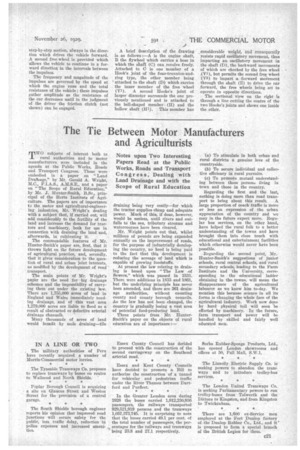The Tie Between Motor Manufacturers and Agriculturists
Page 59

If you've noticed an error in this article please click here to report it so we can fix it.
Notes upon Two Interesting Papers Read at the Public Works, Roads and Transport Congress, Dealing with Land Drainage and with the Scope of Rural Education TWO subjects of interest both to rural authorities and to motor manufacturers were included in the agenda at the Public Works, Roads and Transport Congress. These were embodied in a paper on "Land Drahiage," by Mr. Gerald A. Wright, M.C., F.I.A.S., A.M.S.E., and a paper on "The Scope of Rural Education," by Mr. J. Hunter-Smith, B.Sc., principal of the Herts Institute of Agriculture. The papers are of importance to the motor and agricultural-engineering industries, Mr. Wright's dealing with a subject that, if carried out, will add considerably to the fertility of the land and increase the demand for tractors and machinery, both for use in connection with draining the land and, afterwards, in cultivating it.
The commendable features of Mr. Hunter-Smith's paper are, first, that it throws light on the future development of agricultural practice, and, secondly, that it gives consideration to the question of rural and urban joint interests, as modified by the development of road transport.
The main points of Mr. Wright's paper are the need for big drainage schemes and the impossibility of carrying them out tinder the existing law. There are 1,755,000 acres of land in England and Wales immediately needing drainage, and of this vast area 1,279,000 acres are liable to flood as a result of obstructed or defective arterial drainage channels.
'Many thousands of acres of land would benefit by mole draining—tile draining being very costly—for which the tractor supplies cheap and adequate power. Much of this, if done, however, would be useless, until rivers and outfalls to the sea, tributary streams and watercourses have been cleared.
Mr. Wright points out that, whilst millions of pounds are being expended annually on the improvement of roads, for the purpose of industrially developing the country, no heed is being paid to the fact that this development is reducing the acreage of land which is capable of growing foodstuffs.
At present the raw relating to draining is based upon "The Law of Sewers," which was passed in 1531. There were additions in 1833 and 1861, but the underlying principle has never been amended, and there are 361 drainage authorities, without counting county and county borough councils. As the law has not been changed, the country is gradually losing a vast area of potential food-producing land.
Three points from Mr. HunterSmith's paper on the objects of rural education are of importance:— '(a) To stimulate in both urban and rural districts a genuine love of the countryside.
(b) To secure individual and collective efficiency in rural pursuits.
(e) To promote mutual understanding between those persoas living in town and those in the country.
Regarding the first and the last, nothing is doing more than road trans port to bring about this result. A large proportion of coach traffic is more or less an expression of the urban appreciation of the country and we may in the future expect more. Regular bus services, on the other hand,, have helped the rural folk to a better understanding of the towns and have brought them into close touch with educational and entertainment facilities which otherwise would never have been possible.
Regarding the second point, Mr. Hunter-Smith's suggestions of junior schools, rural central schools, and rural secondary schools, leading to the Farm Institute and the University, corresponding to the educational ladder obtaining in the towns, will mean the disappearance of the agricultural labourer as we know him to-day. We mention this because science in all its forms is changing the whole face of the agricultural industry. Work now done by hard physical toil will soon be effected by machinery. In the future, farm transport and power will he handled by skilled and fairly well educated men.




























































































































